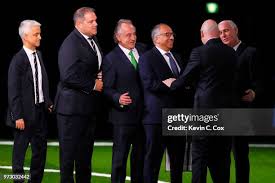The Role and Current Events Surrounding the FIFA President

Introduction
The FIFA President plays a pivotal role in shaping the global landscape of football, overseeing the world’s most popular sport. With the ongoing developments in international competitions and governance, the position of FIFA President remains more significant than ever. In this article, we delve into the recent events involving the current FIFA President, Gianni Infantino, and discuss what these mean for the future of football.
Recent Developments
Gianni Infantino has held the position of FIFA President since 2016, succeeding Sepp Blatter amid controversies surrounding the organisation. Under Infantino’s leadership, FIFA has seen considerable changes, including an expanded World Cup format and efforts to enhance women’s football. As of September 2023, Infantino has been re-elected for a new term in office, further solidifying his influence in football governance.
One significant development is the approach FIFA is taking to modernise its structure and processes. Infantino has advocated for greater transparency and has implemented various reforms aimed at increasing accountability post-2015 scandal. Furthermore, new initiatives designed to develop football in underrepresented regions are already on the agenda, showcasing a commitment to inclusivity.
Impact of Decisions
Following the recent announcement regarding an expanded format for the World Cup in 2026, which will include 48 teams for the first time, national associations and football federations are gearing up for unprecedented competition. Infantino has expressed his belief that this change will increase global viewership and engagement, potentially transforming how the world perceives football.
Moreover, the FIFA President has also committed to investing more in women’s football, aiming at better resources, marketing, and avenues for female players. The recent Women’s World Cup held in 2023 is seen as a pivotal moment, drawing record viewership and underscoring the growing prominence of women’s football globally.
Conclusion
The ongoing leadership of Gianni Infantino as FIFA President reflects a transformative phase in global football. His recent actions and policies indicate a focus on expansion, inclusion, and modernization, marking a new era for FIFA. As football continues to evolve with societal changes, the decisions made now will likely have long-lasting effects on the future of the sport. For fans, players, and stakeholders, keeping an eye on these developments is essential, as they can influence everything from local leagues to international tournaments.
You may also like

Understanding UEFA: The Backbone of European Football
Richard Garlick: A Prominent Figure in Sports Law
